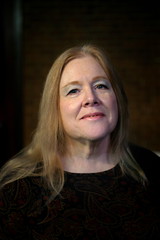Saturday: another country heard from
"I'm a high school senior from the International School Bangkok. In the end of the school year we are putting on a small production with my IB Theatre Arts class. We are all going to present monologues, duets and trios for parents, teacher, and students from school. I'm a dancer, and I really like your play "Snakes and Ladders." It would be great if you'd give me the permission to do it for the production. "
Worked on trying to recruit actors for my play reading a week from Sunday.
Posted -- is it my first? -- on the liberal religion blog, Philocrites.
The question was what writers/theologians influenced the blogg's reader's religious beliefs?
I replied:
1940s-50s: childhood through high school--
Unitarian Sunday School, The Bible and The World Bible, George Eliot, Shakespeare, Greek myths and Greek dramatists, Bertram Russell & Will Durant Theology a subset of philosophy/narrative.
1960s: college & desegregation with CORE and anti- Vietnam--
Plato, Aristotle, existentialists, Suzuki, Alan Watts, Ram Dass, ML King, Emerson, Huxley, Wm James, Wm Blake, Keats & Shelly, Buber, Niebuhr, A N Whitehead, S. Langer, Cox & Coffin
1970s-80s: MA in Feminist Spirituality from Goddard. Read all the relevant female theologians I could beg or borrow. Also studied with James Luther Adams at Arlington St. Church: Tillich, mostly. Re-connected with the Transcendentalists and wrote plays about the Spiritualists, E. C. Stanton, & W E Channing.
1990s-2000s: studied Islam, but without achieving the empathy I'd hoped for. Shocked and awed at the rise of the Fundamentalists. Also caught up in rise of the Internet and the consequent shortening and coarsening of my attention span. Martha Nussbaum, Sen, Said, Armstrong. Grateful for periodic dollops of Buddhism from James Ford, my minister.
David and I stayed up till about 2 am Sun watching the cspan re-run of the Bush- Colbert comedy clash at the Whitehouse Correspondents's dinner, which we discovered was on in the wee hours while destoying our minds by staying up way too late reading political blogs...



